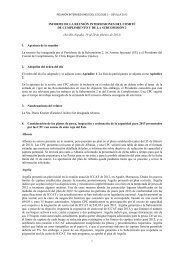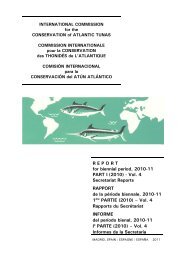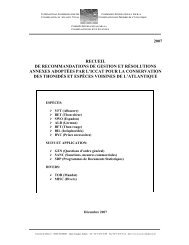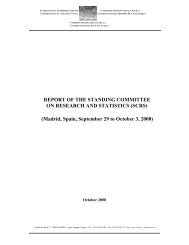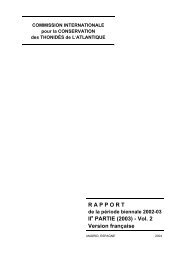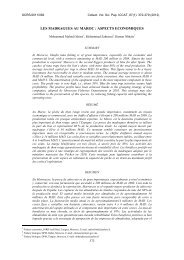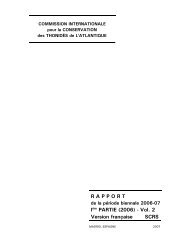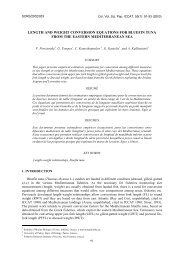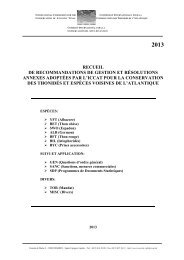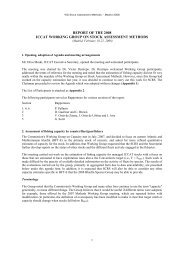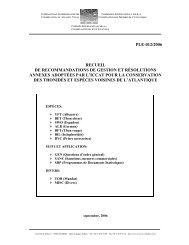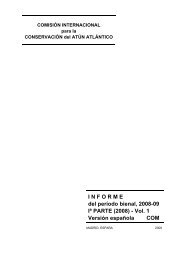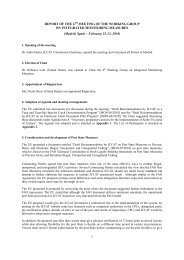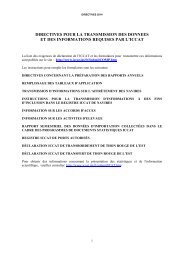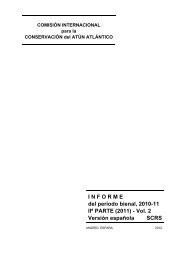E - Iccat
E - Iccat
E - Iccat
Create successful ePaper yourself
Turn your PDF publications into a flip-book with our unique Google optimized e-Paper software.
ICCAT REPORT 2012-2013 (I)<br />
As part of follow-up action at FAO headquarters, a series of six new taskforces have been established to further<br />
FAO’s work in particular areas. One such area is our relationship with all regional fishery bodies, and I am proud<br />
to have been asked to lead the RFB taskforce. Through this role, I look forward to working more collaboratively<br />
with all RFBs, particularly RFMOs as dynamic as ICCAT.<br />
The fourth meeting of the Regional Fishery Body Secretariats’ Network (RSN4) was attended by 32 Regional<br />
Fishery Bodies and a representative from the United Nations Division for Ocean Affairs and the Law of the Sea.<br />
Several months before the RSN meeting, all RFBs were sent a request to contribute a half page on the current<br />
issues facing their organization. A phenomenal amount of data was contributed by all bodies and this was<br />
compiled into a 10,000 word paper on current issues facing the world’s RFBs. The paper was also used to<br />
stimulate discussion at RSN4. The most prolific discussion at the meeting focused on the ongoing problems of<br />
climate change, depleted shark stocks, RFB performance reviews, the lack of international attention being given<br />
to recreational fishing, and the human rights issues of fisheries including child labour in fishing and fisher<br />
safety-of-life-at-sea. In addition to this open discussion, presentations were given by four executive secretaries,<br />
including Driss Meski, who presented an overview of the status and trends in IUU fishing by focusing on the<br />
suite of measures in place among the tuna RFMOs.<br />
This Eighteenth Special Meeting of ICCAT will deal with a wide array of subjects, some of which may be<br />
difficult. However, the Commission has a long history, and it is well placed to deal with all management matters.<br />
The FAO is confident that ICCAT member countries will conduct a productive meeting in Agadir.<br />
I wish you all a very fruitful 18 th Special Meeting of ICCAT.<br />
Food and Agriculture Organization of the United Nations (FAO) statement on t-RFMOs<br />
FAO appreciates the presentation by the Secretariat to introduce the FAO-GEF project “Sustainable<br />
Management of Tuna Fisheries and Biodiversity Conservation in the Areas Beyond National Jurisdiction<br />
(ABNJ)”. FAO also appreciates the support given by various t-RFMO members to the development of this<br />
project as well as participation of t-RFMO Secretariats and others in workshops in Madrid, Kobe 3, during COFI<br />
and Commission meetings.<br />
FAO echoes the comments made by others that this project is in line with and supportive of the work currently<br />
being carried out by the t-RFMOs. In all cases, the objectives of this project are to work with the key<br />
stakeholders and through regular t-RFMO processes to achieve its objectives. The premise of the project is that<br />
more needs to be done to ensure the sustainable management of the oceanic tuna fisheries; this project provides a<br />
unique opportunity to demonstrate some successes which may lead to a second phase project and also more<br />
focused regional projects.<br />
Following project approval, GEF will provide a cash grant through FAO to assist t-RFMOs, their members and<br />
other key stakeholders to address priority issues in these important tuna fisheries on the condition that full<br />
commitment to the project is provided by all project partners.<br />
With respect to t-RFMOs as project partners let me clarify (1) how this project is in line with current procedures<br />
and practices of t-RFMOs, (2) what is being requested by the project and (3) what is not intended as a result of t-<br />
RFMO participation.<br />
• This project is a partnership of the key stakeholders engaged in tuna fisheries.<br />
• This project is working through existing t-RFMO mechanisms / processes. Any findings or results of the<br />
project’s activities would come to the attention of the Commission through regular t-RFMO pathways.<br />
Any decisions to adopt / reject findings of project activities remain strictly with the Commissions.<br />
• The current programmed / planned actions of the t-RFMOs are part of what FAO and GEF call the project<br />
baseline and which allow the project to access incremental funds from the GEF. Accordingly, the project<br />
does not seek any additional t-RFMO funds to be used in support of project activities. FAO also draws<br />
your attention to industry co-financing, which is $34.7M. This figure reflects the industry baseline in the<br />
project. Together with other partners, the total baseline of co-financing of this project allows the project<br />
to access $27.2M of grant from the GEF.<br />
• A common thread in this project is that the GEF grant is a source of incremental funds. Simply stated, the<br />
baseline of the relevant partners provides the opportunity for GEF funds to be accessed. And, GEF<br />
resources provided to the project are intended to enable the activities to be completed within the proposed<br />
56



